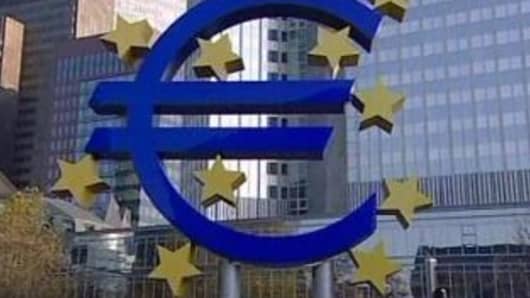Month-on-month inflation was 1.0 percent, Eurostat said.
The March figures are higher than market consensus pegged to the statistics office's initial estimate and well above the ECB's inflation target of below, but close to 2 percent.
The data pushed euro single currency to new record highs against the dollar and the British pound because it made any near-term growth-supporting interest rate cuts from the European Central Bank even more unlikely.
"The ECB will probably keep rates on hold and maintain a hawkish rhetoric. This may help push the EUR/USD to 1.60 in the short term," said Martin van Vliet, economist at ING Bank.
Economists noted, however, that the ECB targeted inflation over the medium term and that price growth was likely to slow down to the bank's target over that period, leaving room for lower interest rates to support slowing economic growth.
"It is not current rates of inflation that the ECB is worried about, it's more about the medium-term prospects for inflation," said Sunil Kapadia, economist at UBS.
"As the ECB targets inflation over the medium term, it will be able to ease policy in the second half of this year. We think they will start easing in the third quarter of this year by an overall 100 bp over three quarters," he said.
Core Inflation Rises Too
Without the volatile prices of energy, which surged 11.2 percent year-on-year in March and unprocessed food, or what the ECB calls core inflation, prices rose 0.9 percent month-on-month and 2.7 percent year-on-year.
That is a strong increase from the annual 2.4 percent in February and 2.3 percent in January for core inflation, which the bank watches for signs that oil price increases are boosting costs in other sectors as well.
The ECB has said it is ready to act to prevent such spillovers and to ensure that wage increases not justified by productivity gains do not push up inflation through so-called second round effects.
"The jump in core prices will intensify concerns in the ECB Governing Council about second round price effects," said Stuart Bennett, senior FX strategist at Calyon.
The rhetoric from the bank is likely to remain hawkish even if signs of a slowdown in GDP increase," he said.
But economists also noted that the higher inflation will erode the purchasing power of euro zone consumers, curbing domestic demand at a time when the record strong euro and a U.S. economy on the brink of a recession are already hurting euro zone exports.
"We believe that markedly weaker euro zone growth over the coming months, an extended credit crunch and very strong euro will ultimately lead the ECB to cut interest rates," said Howard Archer, chief European economist at Global Insight.
"However, this seems unlikely to happen before September given current elevated euro zone inflation levels and risks."


